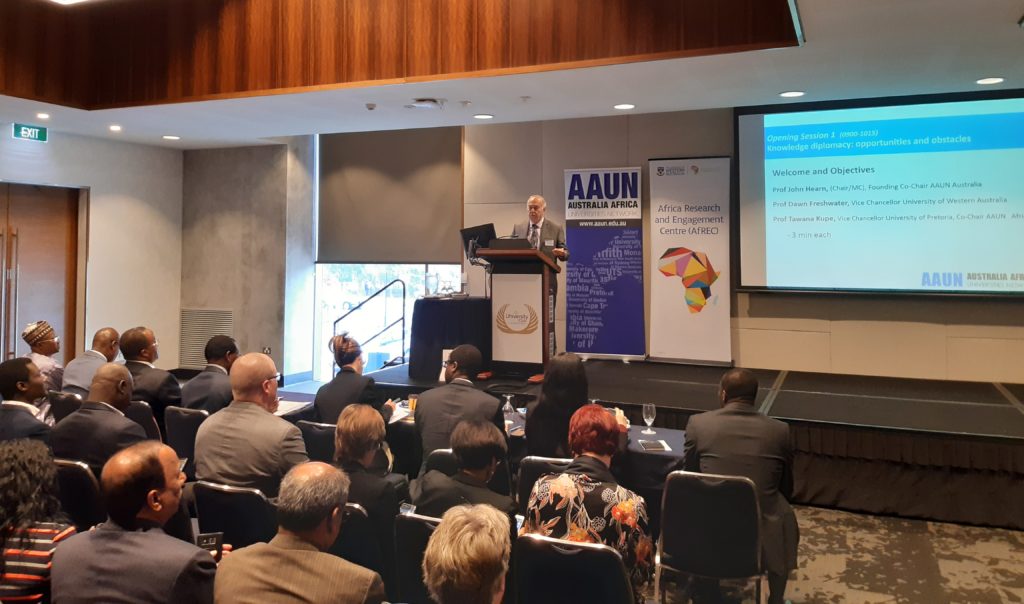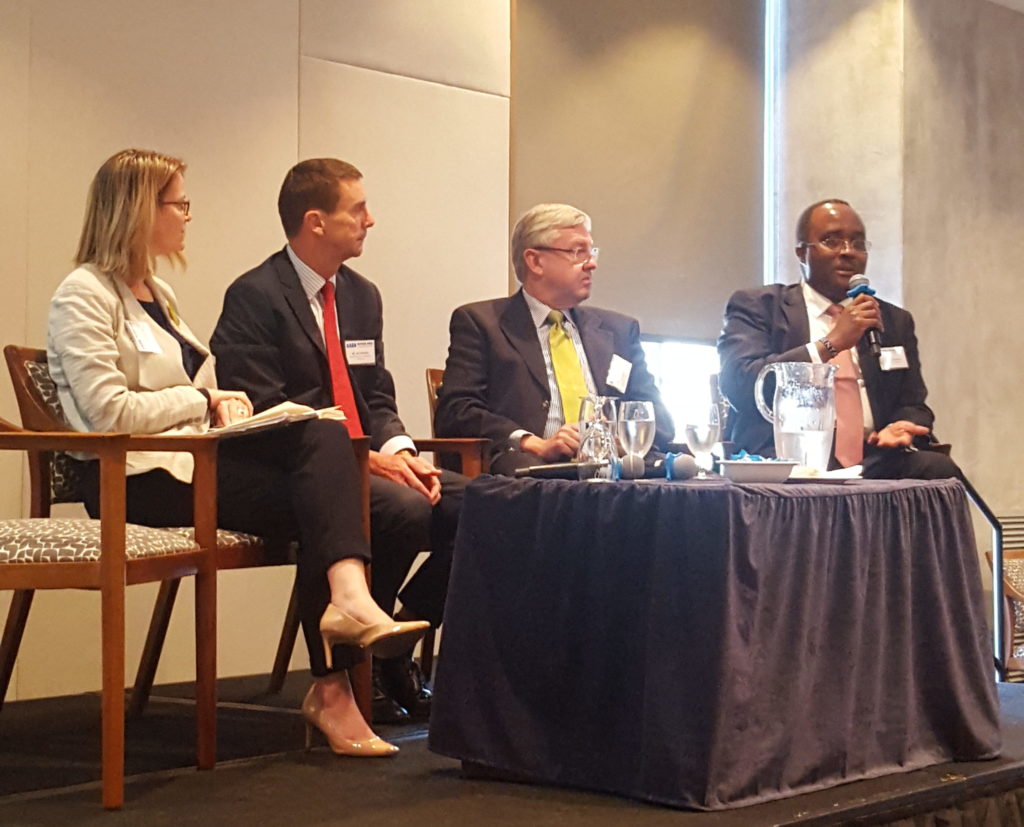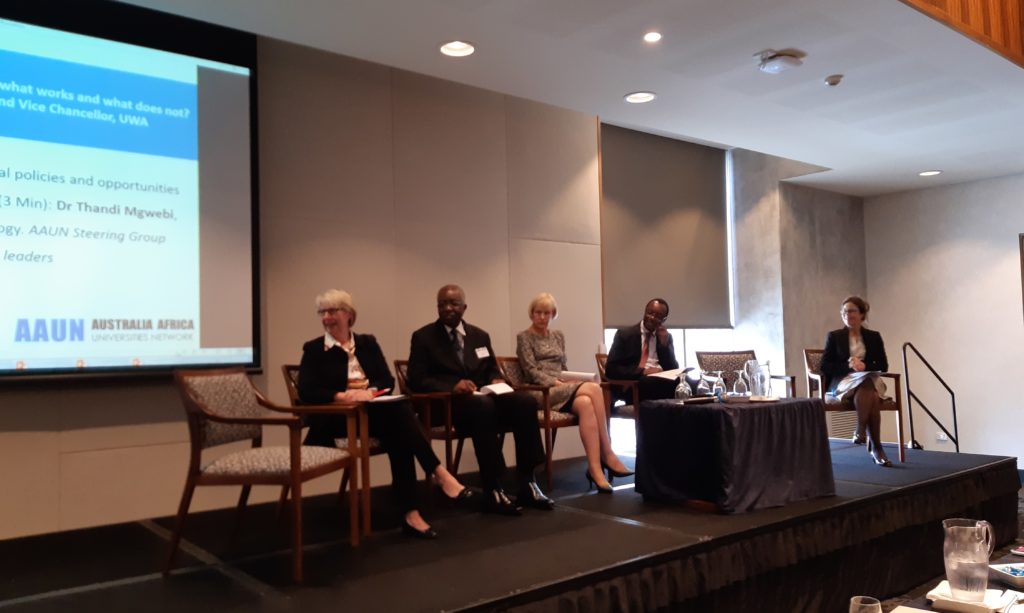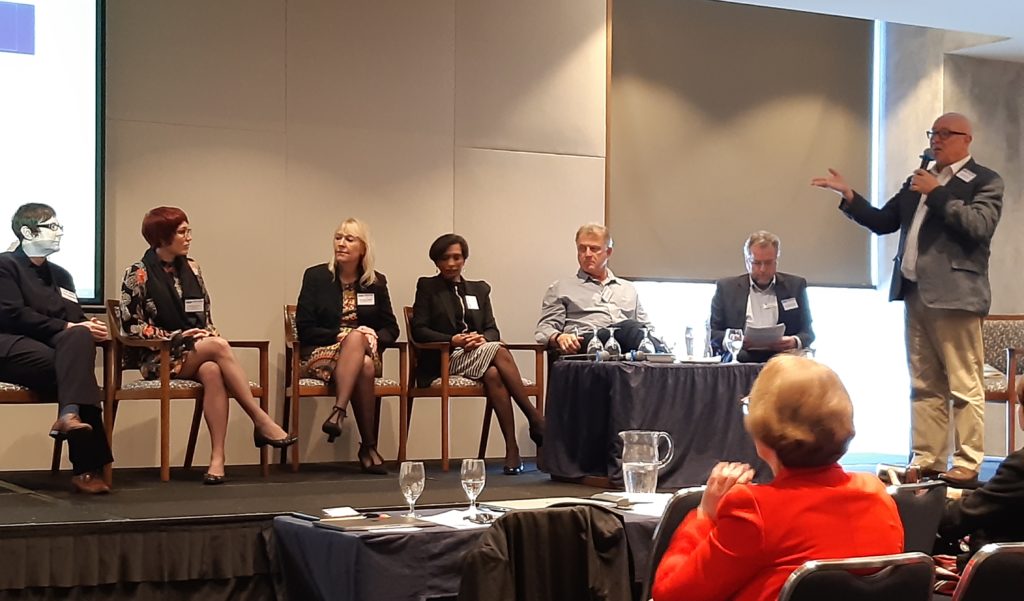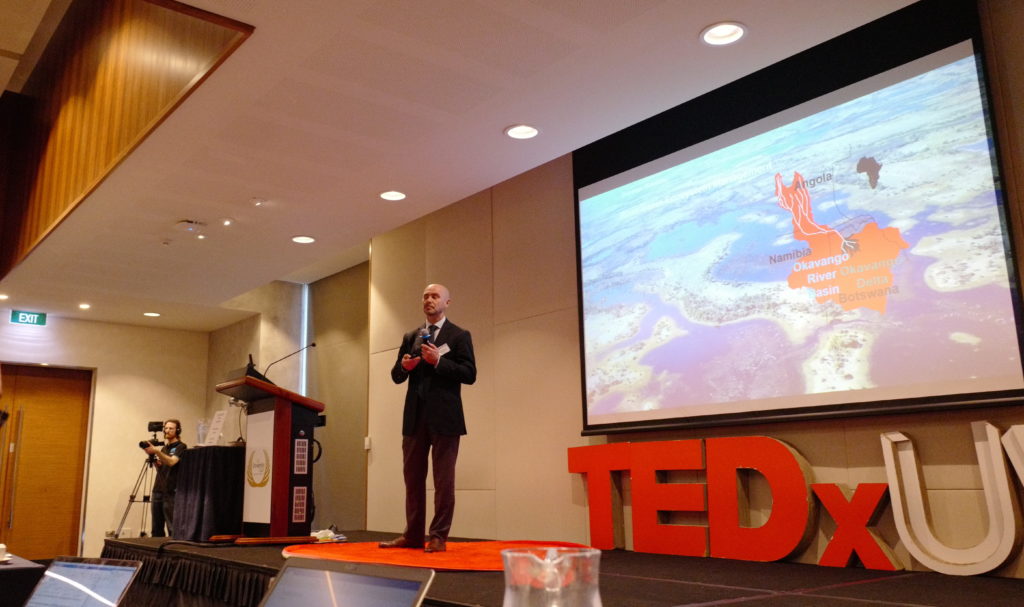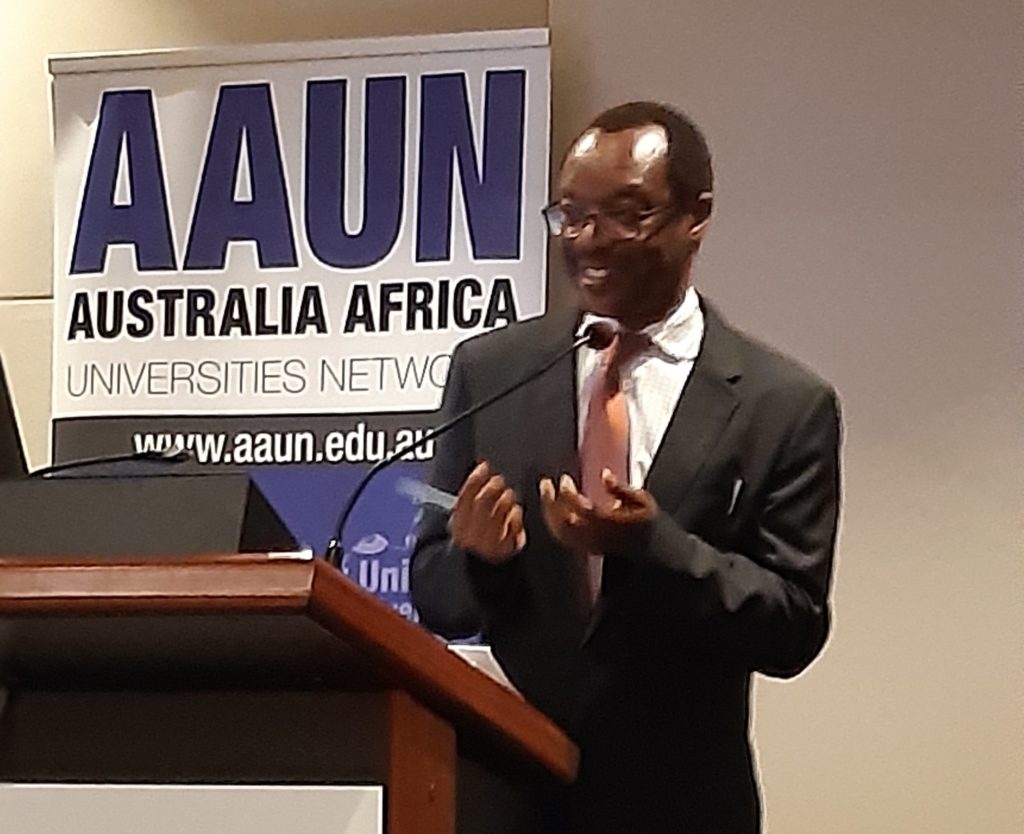AAUN Australia Forum and AGM 2019 – SUMMARY REPORT

Strengthening Australia-Africa University Relationships
FRAMEWORK – strengthening knowledge partnerships for education, research and economic development:
The international policy framework is shaped around the UN Sustainable Development Goals (SDGs), the China Belt and Road Initiative (BRI), the UN Paris Climate Accords (COP), the AU Africa Agenda 2063 and national policies. These include the Australian International Strategy White Paper 2017; and recently the Australian Government response to the Senate Foreign Affairs, Defense and Trade References Committee Report on the relationships with Africa.
AAUN FORUM STRUCTURE – learning from experience to deliver better results:
Within the broad development of policies, this AAUN Forum was designed to strengthen Australia Africa University teamwork and in addressing global challenges. In opening session 1 participants were asked to identify opportunities and gaps for further research. Session 2 brought the experience of major universities in exploring what approaches work and what more can be done. Session 3 highlighted several successful and diverse AAUN initiatives, based on Partnership Fund competition, that have achieved innovation and impact in relatively short time. In Session 4, three speakers debated “Water for Life” in a TEDX session that was communicated across Africa and Australia.
AAUN FORUM OUTCOMES
– Building the next AAUN Strategic Plan 2020-22 and Action Plan 2020:
The conclusions of the forum in Session 5 are a further step in the development of AAUN, focusing on targets within our capacity and our competitiveness to attract external funding.
SESSION 1 – Knowledge Diplomacy: opportunities and obstacles
After the Welcome to Country and the Welcome session from John Hearn, Dawn Freshwater and Tawana Kupe, two books from AAUN associated projects and authors were launched. “Africa and the Sustainable Development Goals” edited by Maano Ramutsindela and David Mickler; and “Australia and Africa: A new friend from the South” by Nikola Pijović. These provided the status of SDG partnerships and research, and the need for Australia to define its interests and opportunities with Africa, while building equal partnerships in identified areas for cooperation.
The session, with keynote speakers Isaiya Kabira, Dean of the African Diplomatic Corps; Marthinus van Schalkwyk, High Commissioner of South Africa; and Ian Halliday, Austrade General Manager for Middle East and Africa; presented the status of current teamwork and proposed several new areas for cooperation in future. These were enhanced by Jenny Dee, High Commissioner to Mauritius and several colleagues from DFAT and African governments. The need for continuing energy and commitment was encouraged, with stronger links to business, commerce and communities so that research builds capacity and sustainability for the future – with tangible results in the short and medium term.
Among recommendations for new areas for AAUN teams were Biodiversity, the Marine Economy, Biowaste, and the urgent needs to empower early career researchers, women and men, to grow as future research and education leaders.
SESSION 2 – Strengthening University Relationships: what works and what does not?
Professor Tawana Kupe (Pretoria), Deborah Terry (Curtin), Anthony Adjei (Ghana) and Eeva Leinonen (Murdoch), presented the priorities of their Universities and the lessons from international engagement. Dr Thandni Mgwebi (Tshwane) introduced the discussion.
Major research universities are national assets at the centre of economic development. The global policy framework provides enormous opportunity for engagement of all concerned. However, 5 years of the 15 year SDG timeframe to 2015-2030 have already passed and a greater sense of urgency, innovation and multidisciplinary organization is required. African global University Networks must develop and attract brains, infrastructure and resources for the major challenges. In addition to technical and economic knowledge and skills, social and business strengths are necessary if climate change, the NCDs and Biome, 4th industrial revolution and STEM education are to be advanced.
A proposal that AAUN form an international policy group to bring research evidence to policy options will be examined.
SESSION 3 – AAUN Innovation Programs and Communications
Six Principal Investigators from AAUN Programs presented their results and impact in new knowledge and team building. Profs Karen Charlton (U Wollongong), Peter Johnson (UCT), Wallace Cowling (UWA), Prem Ramburuth (UNSW), Melody Mentz-Coetzee (UP), and Lisa Watts (The Conversation – Australia). Dr Bett Bosiburi (ACIAR) introduced the discussion.
These presentations, as 7 examples of the 53 AAUN Research Programs, showed frontier research in AAUN areas of work including dietary salt and blood pressure, climate change and food security, plant genetics, women in the workforce, and attrition in education pathways. The discussion around communication focused on the need for experts from Universities to engage and comment on major issues of the day, informing and influencing policies and people.
Among the topics debated were the creation and retention of early career researchers, and the actions of AAUN members in this regard. One priority put forward was the need to make agriculture and science cool again.
SESSION 4 – TEDX Session “Water for Life”
Professors Greg Leslie (UNSW), Basant Maheshwari (WSU) and Anas Ghadouani (UWA) provided a lively session in which they summarized the directions of their research in Australia and Africa, the major challenges facing the availability and access of water in times of climate change, population increase, pollution, urbanization and loss of biodiversity. The videos of the presentations and discussion are available of the websites of UWA and AAUN.
SESSION 5 – CLOSING SESSION
The Chairs of the four working sessions presented the main outcomes of their sessions (summarized above) and focused on a few key themes on which to proceed with the development of AAUN in its next Strategic Plan. These included (i) further strengthening of the Australia Africa platform of teams and programs in the 5 “Securities” where we are funded to work (Environment, Food, Health, Education, Economic Development); Strengthen the strategic partnerships of AAUN to include a careful expansion to 30 Universities, governments and business, alumni and communities; and (iii) plan carefully for self sufficiency and sustainability in all AAUN activities. Successful programs are ready to bid for further international funding. Further efforts are needed to communicate and promote AAUN research and education success.
********
Forum Program and Speakers Bios & Abstracts
Bios of Speakers and Abstracts of presentations
Background reference papers
- AU – Africa Agenda 2063
- Africa – Development Aid at a Glance 2018
- DFAT – Sub-Saharan Africa Aid Program 2017-18
- Aus Govt – Response Trade and investment relationships with the countries of Africa
- Austrade – East and West Africa Education – presentation for AAUN
- AAUN – China Aid to Africa
NOTES:
To follow up with the AAUN Annual Report, Strategic Plan 2020-22; Future Directions and Action Plan 2020, please see www.aaun.edu.au
In addition, please visit our website for expanded stories developed from the Forum and written by Marjorie Lewis Jones.
- AAUN Forum 2019 reviews Australia Africa engagement and plans strategy 2020-22
- Strengthening Africa Australia links through knowledge diplomacy
- Forming formidable global alliances with influence and impact
- When it comes to Innovation, international partnerships help us learn from each other
- Hot Topics: (i) Empowering women at work; (ii) Breeding better beans; (iii) Being sage with salt
- Water for Life – TEDX Session. Water wastage – it’s a lifestyle problem
Information also on current and planned events, news and AAUN opportunities (Fora, Programs, News, Funding). To contribute your suggestions or comment, please contact AAUN General Manager Grace Liu g.liu@sydney.edu.au

